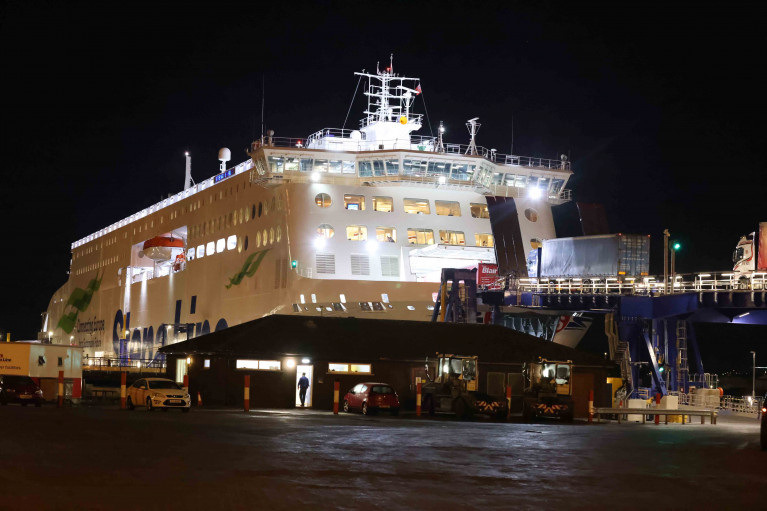Displaying items by tag: BelfastBirkenhead (Liverpool)
Ferry Operator's New Stena Embla Makes Maiden Sailing on Belfast-Birkenhead (Liverpool) Route
The newest Stena Line ferry on the Irish Sea made its inaugural crossing on the Belfast-Birkenhead (Liverpool) service last night and as Afloat adds this follows a debut albeit temporarily on the Rosslare-Cherbourg route to enable extra capacity.
Stena Embla joined another E-Flexer ro-pax class Stena Edda on the popular Belfast – Liverpool route with the capacity to carry 1,000 passengers, 120 cars and with 3,100 freight lane meters.
The Chinese built newbuild will increase the Belfast – Liverpool service freight capacity by 20% and raise passenger capacity by 33%.
Paul Grant, Stena Line’s Irish Sea Trade Director said: “Stena Embla will make one daily return trip between Belfast and Liverpool. We have now invested over £400m in our ferries and port facilities on the Irish Sea in recent years. The Belfast-Liverpool route is one of the most popular Irish Sea crossings for both freight and leisure traffic so having a second vessel of the calibre of Stena Embla, with a host of high-quality passenger facilities, will further increase its appeal and expand our capacity. In March 2020 we launched our new build Stena Edda onto the Belfast-Liverpool service and the feedback from our freight and leisure customers was extremely positive.
He added "Now we will have two ships offering identical services and facilities which will help take our service levels on the route to new heights. We have real confidence in the future of our Belfast services and our Irish Sea routes in general, which is why this region has attracted three brand new ships in the last 12 months alone.”
#FerryNews - One of the two new Stena Line E-Flexer RoPax ferries bound for the Belfast–Liverpool route in 2020 has recently marked an important production milestone by celebrating its official keel-laying at the AVIC shipyard in Weihai, China.
The new RoPax vessels will have capacity for 1,000 passengers, 120 cars as well as 3,100 freight lane meters.
The newbuild pair be among the most energy efficient in the world with significantly lower CO2 emissions per freight unit against comparable RoPax tonnage. Paul Grant, Stena Line’s Trade Director (Irish Sea North) commented: “Everyone on the route is looking forward to welcoming the new generation of ferries to Belfast. We are delighted that two of the new fleet of E-Flexer ships will be entering service on our expanding Belfast – Liverpool route. It’s a real vote of confidence in the future development of our operations in the region.”
Paul Grant added: “The two new ships will be the biggest ships ever to operate on the Belfast – Liverpool service and will increase capacity for freight and travel customers as well as raising the service standards. Our onboard cabin concept will be enhanced to offer comfortable and relaxing day and overnight crossing options. The ships will be ‘drive-through’ making the loading and disembarkation processes faster and smoother for vehicles.”
Newbuild Quartet for Stena Planned for Belfast Routes
#NewbuildsBelfast - A newbuild contract announced last year by Stena for a quartet of ropax ferry vessels with a delivery schedule during 2019 and 2020 are planned for Irish Sea service. The vessels are being built at the AVIC Shipyard in China. The plan is to locate the ferries specifically on routes to and from the line's expanding Belfast hub.
The contract also contains an option for another four vessels to be ordered.
“The routes to and from Belfast are strategically very important to Stena Line and during the last number of years we have made significant investments in ports and vessels to improve and develop our capacity offering a frequent high quality service for our customers to and from Belfast. Looking ahead, we intend to continue our ambitious development plan for our business in the region and the new vessels are a part of this strategic plan. During the last few years we have seen a steady growth in freight and passenger volumes and we believe this will continue. Last year was a record year for us when we for the first time carried over 500,000 freight units through Belfast Port. These new vessels will be the largest ferries ever to operate between Belfast and Great Britain”, said Stena Line’s CEO Niclas Mårtensson.
Joe O’Neill, Commercial Director, Belfast Harbour commented: “We are delighted that Stena Line is planning for Belfast as the location for its next generation of RoPax vessels in what is a significant investment in and enhancement of Northern Ireland’s premier freight and tourism gateway. Belfast Harbour has worked in close partnership with Stena Line over the last two decades to help it expand its Belfast routes into a flourishing hub and this very welcome investment news comes on the back of a record year for Stena Line’s freight business in Belfast Harbour. We look forward to welcoming the new vessels and the associated benefits they will bring to Belfast Harbour and the economy of Northern Ireland.”
The new vessels are being constructed in line with Stena Line’s strategic focus on sustainability.
“The new RoPax vessels will be among the most fuel efficient in the world with approximately 25% lower CO2 emissions per cargo unit than current RoPax tonnage. Our aim is to lead the development of sustainability within the shipping industry and set a new industry standard when it comes to operational performance, emissions and cost competiveness. The vessels will run on traditional fuel, but are designed to the class notation “gas ready” and are also prepared for scrubbers as well as catalytic converters, giving us flexibility for the future”, says Niclas Mårtensson.
























































